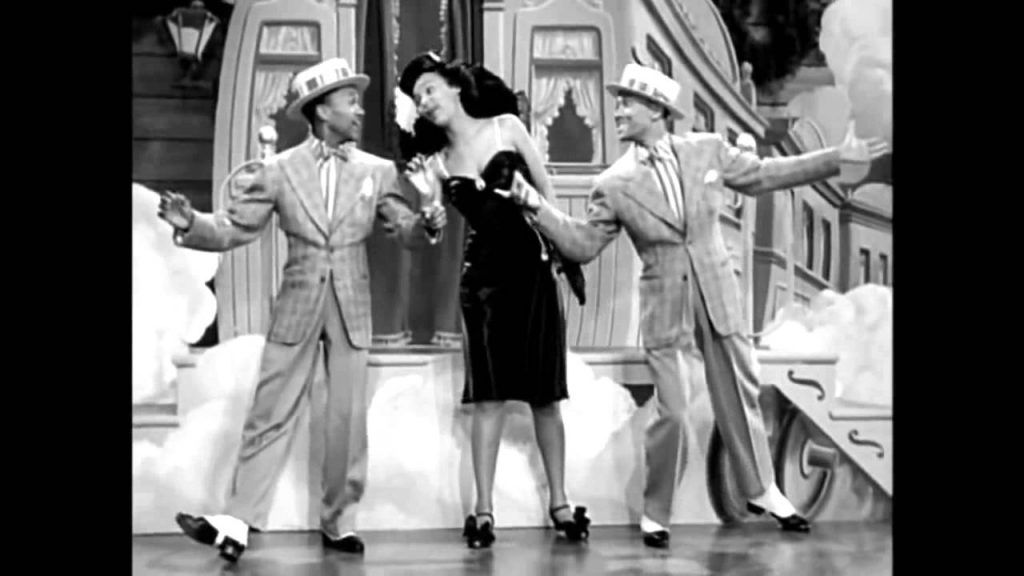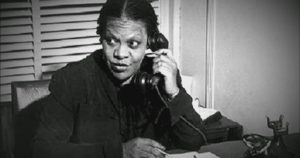It’s the evening of March 30, 1955. It’s the night of the 27th Academy Awards in Hollywood California. The celebrities are arriving in their limousines, and emerging from one of these, herded with blinding flashing lights, is a star. This star, from Cleveland, Ohio, is living out her dream. She has been nominated for the Best Actress award. Tonight, she’s making history. This woman is Dorothy Dandridge, and just for her being nominated, she is making history. Dorothy is the first African-American woman ever to be nominated for this award. And this nomination changed the way Americans thought, at least for that night. That Oscar would look so befitting in her hands. Her photo holding that Oscar from that night would be on every cover of every magazine in the country by the morning. Unfortunately, we never got to see that photo, because Dorothy did not win that night.

Dorothy Dandridge, born on November 9, 1922, first began her start in show business with her sister and another young woman in a musical trio. Once they gathered enough attention, they began performing at the Cotton Club during the 1930s.1 The famed Cotton Club was the dance club based in Harlem, New York where the most popular black singers and dancers performed, such as Cab Calloway and Duke Ellington, and it was where Dorothy Dandridge met her future husband. Here, Dorothy and her trio became so popular that they decided to take their show on tour to England. She finally married her husband, Harold Nicholas, of the Nicholas Brothers. The Nicholas Brothers were a duet who sang and tap danced together. Dorothy and Harold married on September 6, 1942. Dorothy’s marriage to Harold, however, was an unhealthy one, because her trio was receiving more fame than the Harold Brothers, causing tensions between them, and because Harold was also having affairs. But shortly after her marriage, Dorothy became pregnant and gave birth on September 2, 1943, and her baby girl was born brain damaged, due to a lack of oxygen. For the best for the child, Dorothy put her daughter in a private care agency. And after a number of years struggling with Harold and his infidelity, she finally divorced him in 1949.2
Determined to get back on her feet following the divorce, Dorothy decided to begin a solo career as a singer. It is as a singer that she gathered many fans and attention. But Dorothy always had a strong interest in acting. In 1948, when things in her marriage were rocky, she enrolled in The Actor’s Lab, which was the prestigious training school for actors in Los Angeles, California. During the 1940s, The Actor’s Lab trained many future Hollywood stars, including Marilyn Monroe. But during this period in cinematic history, it was hard for a black person to get leading roles on the big screen, especially roles that would change how black people were seen in society in general. In spite of her training at The Actor’s Lab, Dorothy would not get the opportunity to play black characters with strong, complex roles.3
As a black woman at this time in American history, if one wanted to act, one would not be given intelligent or self-respecting roles. The roles black women were given were highly stereotypical, but if acting was ones dream, as it was for Dorothy, she would take those stock roles anyway. After leaving The Actor’s Lab, Dorothy became one of those women who was offered those stock, degrading roles. Her first roles were those that had always been derogatory for black women, such as playing the role of a mistress.4 Such was the case in her films Tamango and Island in the Sun. Those roles were certainly easy for a black woman to portray. And Dorothy would receive roles like this until, finally, she landed a role alongside Harry Belafonte. Dorothy became the lead actress in the 1953 film Bright Road, in which she portrays a school teacher helping the principal, Harry Belafonte, tame their problem students. Her role in the film became a success, and it put Dorothy on the map, and brought her acclaim as an actress. But Dorothy wanted a bigger role. She sought out the lead role as Carmen in the 1954 film Carmen Jones. It was hard for black women to receive self-respecting roles in films, but ironically, in order to get such roles, one must first put on the act of not being self-respecting.5

At first, Dorothy was declined the role of Carmen Jones, and it was only after walking into the audition appearing promiscuous that she was given the role. Carmen Jones is a Broadway musical, but it was turned into a musical film starring an all-black cast, with the likes of Harry Belafonte and Pearl Bailey, and directed by Otto Preminger. Known for bringing any character she portrayed to life with her beauty, charisma, and flirtatious style, the role of Carmen Jones solidified Dorothy’s nomination. Shortly, after getting the role, she was put on the cover of Life Magazine in the same attire she auditioned in. Here Dorothy made history. Dorothy became the first African-American woman to grace the cover of Life. This role also got Dorothy Dandridge an Oscar nomination, becoming the first African-American woman nominated for the Best Actress Award. In 1955, it was hard for a black woman, or black man, to get the respect they deserved from the elite Academy of Motion Picture Arts and Sciences, much less be nominated for one of the most prestigious awards any actor can receive. This nomination was important not only for Dorothy, but for the millions of black men and boys, women and girls, who had the opportunity of watching history unfold, and being given a sense of hope and belief in themselves that they may not have had before those awards began.6
That night was important for America, for the black community, and for Dorothy, even though she did not win. She held her own going against some of the most iconic figures in film that night. The other nominees for the award were Judy Garland, Audrey Hepburn, Jane Wyman, and Grace Kelly. Grace Kelly was the winner of the award for her performance in The Country Girl.7

In Hollywood in 1955, Dorothy Dandridge was a double threat: she was a woman and she was black. Because of this, many opportunities passed her by. She was quoted as saying, “If I were Betty Grable, I could capture the world.” Betty Grable was an American singer, dancer, and actress prominent throughout the 1930s and 1940s. This much was true. Dorothy had much to offer, and it seems absurd today that such a minuscule thing such as race could keep someone from practicing their dream, but this is just what kept Dorothy and others’ dreams undermined. Unlike many, Dorothy Dandridge tackled this arbitrary system of discrimination head on, and she became a star. But she was not allowed to shine as brightly as many of her colleagues.8


After her nomination, Dorothy signed a contract with Twentieth Century Fox, entitling her to three more films. She was established as one of the biggest stars of the time. Unfortunately, Dorothy’s last role was in Preminger’s musical Porgy and Bess. On September 8, 1965 a star had truly fallen. Dorothy’s deceased body was found in her apartment. Decades later she would be reincarnated by Halle Berry in the film Introducing Dorothy Dandridge.9

Plagued by the segregation, sexism, and racism of the times, Dorothy Dandridge could not handle it and succumbed to demise. Hollywood throughout the forties and to the sixties reflected America and its racial tensions. Given the racial inequities of the era, Hollywood was not ready to have many leading roles for black women, and this showed through Dorothy’s career. Dorothy Dandridge inspired many, especially after her death. She broke many barriers for aspiring young black actors internationally. She had a dream, but because of her pigmentation, she was treated differently. Despite these odds, Dorothy was a still a formidable and respected actress. Dorothy was finally noticed as the prolific star she was, by being given an honorary star on the walk of fame on January 18, 1983, in Los Angeles, California.10
- African American Eras: Segregation to Civil Rights Times, 2011, s.v. “Dandridge, Dorothy” (1922–1965). ↵
- Rogers Patrick & Lyndon Stambler, “Overdue notice,” People 48, no. 4 (1997): 89. ↵
- Marguerite H. Rippy, “Exhuming Dorothy Dandridge: the black sex goddess and classic Hollywood cinema,” CineAction, no. 44 (1997): 21. ↵
- Louie Robinson, “The Private World of Dorothy Dandridge,” Ebony 17, no. 8 (1962): 116. ↵
- Cynthia Gorney, “The Fragile Flame of Dorothy Dandridge,” The Washington Post, February 09, 1988. ↵
- Walter Leavy, “The mystery and real-life tragedy of Dorothy Dandridge,” Ebony 49, no. 2 (December 1993): 36. ↵
- Robert K. Lightning, “Dorothy Dandridge: ruminations on black stardom,” CineAction, no. 44 (1997): 31. ↵
- Encyclopaedia Britannica, May 2017, s.v. “Dorothy Dandridge.” ↵
- Erin Anderson, “Dorothy Dandridge: Singer & Actress,” Booklist (2011), 71. ↵
- Ed Guerrero, “Dorothy Dandridge: A Biography,” Cineaste, Vol. 23 Issue 4 (1998): 60. ↵



85 comments
Alondra Aviles
Before reading this article, I had never heard of Dorothy Dandrige. It was well written and had a lot of detail and information while maintaining an interesting outreach. The fact that she suffered a lot of backlash and was turned down many times due to her skin color is seemingly outrageous now, since her acting was exceptional. The racial tension at the time made many in the theatrical industry suffer, Dandrige is a great example of this discrimination. She overcame many obstacles and was properly recognized for her talent; it’s almost unfair that she had to pass away before she was formally accepted as an actress and an artist.
Auroara-Juhl Nikkels
I had a little knowledge of Dorothy Dandridge, mostly I had just heard the name before and knew she was an actress. I had no idea that she was nominated for an Oscar, let alone the first African American woman to be nominated. Even if she did not win that night, she made history, like you said, by just being nominated. It’s sad that she died before ever really reaching some of her biggest dreams, but she definitely left an impact on the world, even if we don’t know too much about her ourselves.
Rebekah Esquivel
Before reading this article I had never heard of Dorothy Dandridge. Although she died at a very young age and had a rough upbringing she is an inspiration to many. She helped pave the way for black actresses to come. She really helped show that everyone should follow their dreams no matter what obstacles they face. Despite her competition and all of the other struggles she faced because of her race she continued to fight for what she wanted eventually reaching her goal.
Benjamin Voy
What an amazing article that described the life of an extremely influential figure that not many people may have heard of. I also have never heard of Dorothy Dandridge. What she did for the African-American community is so amazing. She paved the way for the modern actress’s and actor’s of our generation and stood up for equal rights which has had major effects on our modern community. Great article
Jasmine Martinez
I had never heard of Dorothy Dandridge, and this was a very informative article. I really liked how it was written, I learned a lot about Dorothy. I really liked the fact that you included those videos it was great to actually see what she was capable of doing. I feel so sad that she died at such a young age, but I believe she accomplished and overcame many obstacles in her life, and that is amazing.
Andrea Chavez
I had never heard the name Dorothy Dandridge before reading this article. It is really unfortunate her ending, I truly feel bad for her marriage. She seemed to be an aspiring black actress who changed many of the norms in Hollywood at the time. And even worse how she treated her child, in my opinion to keep living her carrier instead of actually taking care of the poor baby. This woman had talent and I’m glad she got to share it with the world.
Brianda Gomez
Before reading this article, I had never heard of “Dorothy Dandridge”. She was the first African American woman to ever be nominated for the Best Actress Award. I really enjoyed reading this article and learning about Dorothy and her journey. Although she passed away on September 8, 1965 she was one of the biggest stars of all time. She inspired many and paved the way for other African American actresses.
Kalyani Olson
Although Dorothy had built herself a great career despite all the submissive gestures she made to get there, she was a forerunner to a great opportunity that was hard to maintain. Trusting others to honestly care for and cultivate the small fortune she acquired, she was taken advantage of as many artists are when confronted with trusting those you care about who don’t share that virtue. She will always be remembered for her timeless beauty, great talent and her integrity in a time when she most deserved support and love. May she rest in peace in God’s loving arms.
Alejandra Mendez
I had never before heard of the famous Dorothy Dandridge. I am glad I now know of her inspiring story however. Her dedication to succeed despite her competition and the many obstacles she faced, I think, is very motivational to anyone who faces a challenge holding them back. It shows that one really should never give up their dreams despite the circumstances. I wish more people knew about her however and wish that her name was more out there and in the spotlight to make up for the spotlight she never received while she was alive.
Dayna Valdez
The article began with a very interesting and great introduction. Prior to reading the article, I had never heard of Dorothy or who she was. However, I after reading the article, I had this clear image of who she was and even how famous she was! Despite many obstacles and not winning the Best Actress award, she truly did make history.
Marco Picardo
Very well written and put together article. I would have never known about Dorothy Dandridge if it was not for this article. She was no doubt a trailblazer for her time and opened the doorway for other black actresses. She changed the game. It was shocking that she lived such a short life. I’m sure she would have contributed much more.